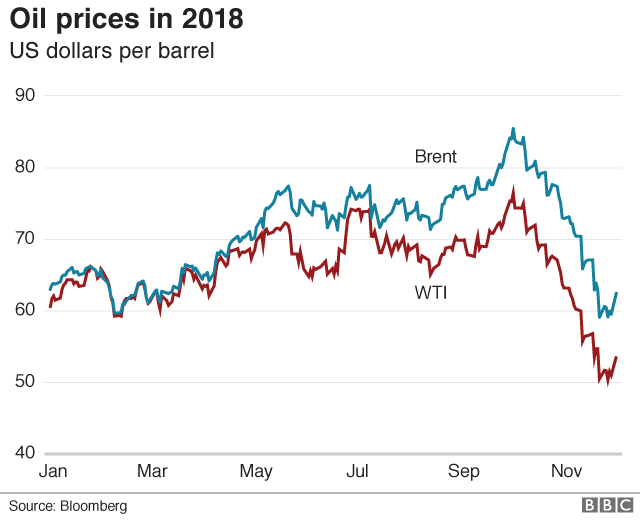
Qatar has announced it is pulling out of the Opec oil producers' cartel, just days before the group meets in Vienna.
The Gulf state, which joined Opec in 1961, said it would leave the cartel in January and would focus on gas production.
Qatar, the world's biggest exporter of liquefied natural gas, has been boycotted by some Arab neighbours over allegations that it funds terrorism.
Opec is expected to cut oil supply at this week's meeting.
Explaining Qatar's decision, Energy Minister Saad al-Kaabi said: "We don't have great potential (in oil), we are very realistic. Our potential is gas."
He said geopolitics was not factor in the decision.
Since June 2017, Qatar has been cut off by some of its powerful Arab neighbours, particularly Saudi Arabia, over its alleged support for terrorism.

Qatar's withdrawal from Opec may not have any lasting impact on the price of oil as it a relatively small producer.
But this week's meeting of Opec is being closely watched by markets for any agreement over cuts to production after the oil price fell sharply in November.
Analysis: Qatar grows apart from its Gulf neighbours

By Paul Blake, Middle East business reporter
Qatar is Opec's 11th biggest oil producer - which is to say it's one of the smallest producers in the cartel, clocking in at less than 2% of the group's output.
While its departure might not mean much for Opec's influence over the oil market, it is important to see the decision within the broader geopolitical climate here in the Middle East.
Opec's de facto leader Saudi Arabia has been leading a regional blockade on Qatar that has seen trade and travel links severed since June 2017.
While Qatar's energy minister insists that the decision was not political, the withdrawal from Opec after 57 years in the club is just another way that Qatar and its Gulf Arab cousins are growing further apart as relations deteriorate.
Expectations are high that Opec will reach an agreement on output this week after Russian President Vladimir Putin said at the weekend that he and Saudi Arabia's Crown Prince Mohammed bin Salman "have agreed to extend our agreement" to limit production.
Russia is not a member of Opec, but is one of the biggest oil producers outside the group.
Mr Putin's comments pushed oil prices higher. In early trading on Monday, Brent crude was $2.60 higher at $62.06 a barrel, while US West Texas Intermediate oil rose $2.42 to $53.35 a barrel.
However, prices are down sharply from September - when Brent crude was at $81.16 a barrel - because of concerns about over supply.
Qatar produces around 650,000 of barrels of oil a day, compared with Russia's 11.37 million barrels a day.